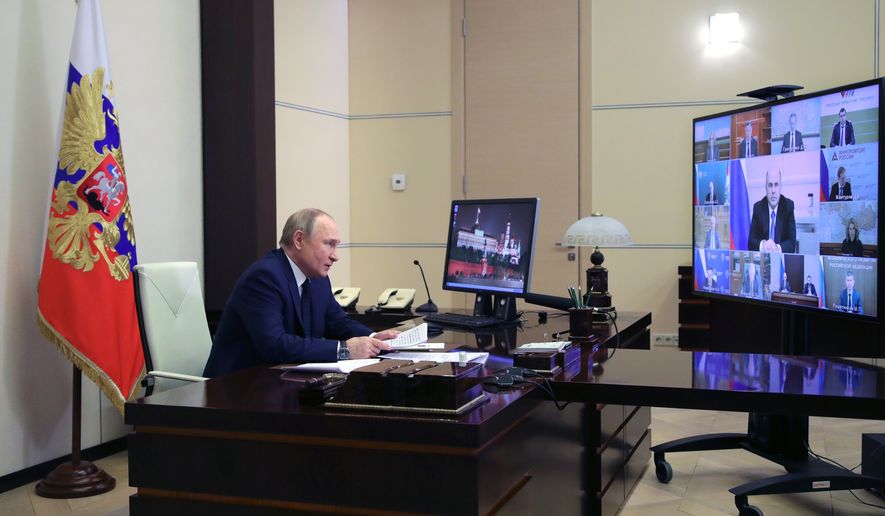OPINION:
With Moscow’s foreign reserves frozen and the rouble in freefall, Western sanctions for Russia’s invasion of Ukraine are biting hard. Attention must now move to sustain the clutch. Vigilance should be paid to potential holes in the sanction regime through third-party countries. Naturally, that gaze falls upon the post-soviet world still allied to Russia.
Some have not grasped the significance of the time, continuing to believe the West can play off Russia for perceived national benefit. Breaking with Europe in refusing to impose sanctions while increasing flights to Moscow as others did the opposite, EU-aspirant Serbia has failed to recognize the world bifurcating along with Putin’s war – and felt heavy pressure to change tack.
Serbian myopia might be pinned on President Vucic’s corruption, seeking a potential windfall in sanctions-busting. Others are more compromised, swimming in an alphabet soup of supranational organizations that lock them into Russia’s orbit.
Armenia, Kazakhstan, and Kyrgyzstan are, with Russia and Belarus, members of the Eurasian Economic Union (EAEU), a post-soviet version of the EU’s single market. It would allow Russia to keep importing all it needs through those nations’ borders, presenting Russia an opportunity to bypass Western sanctions. The logic runs they too must be sanctioned if pressure is to be sustained.
Of the three, Armenia straddles the widest position: It is the most economically and militarily dependent on Russia and the most active in making friends in the West – receiving funds and diplomatic support in kind.
Increasingly unsustainable over recent years, the contradiction has broken under its own weight. As Ukraine suffered shock and awe bombardment on the Russian pretext of protecting the self-proclaimed Republics of Donetsk and Luhansk, Armenia lobbied Washington for $50 million on behalf of a similar puppet state across the Black Sea. Based in neighboring Azerbaijan’s internationally recognized territory, it is known in Armenia as Artsakh. Here too, Russian ‘peacekeepers’ are present. They defend what is left of the separatist state after Azerbaijan retook lands occupied for nearly 30 years in a short conflict in 2020.
Moreover, the President of the pseudo-state hailed Russia’s pre-invasion recognition of Donetsk and Luhansk, along with his counterparts in Russian breakaway Abkhazia and South Ossetia in Georgia. He and his administration had clearly chosen their side in the war. Yet that didn’t stop Armenia from lobbying the US for aid on its behalf.
It demonstrates Armenia too believes it can continue to look both ways. As sanctions ramp up, that equivocation is no longer plausible. Armenia, and nations like it, must make a choice on their global alignment post-invasion.
Turning away from Moscow will be painful. Russia is Armenia’s largest trading partner and foreign investor. It controls the country’s nuclear plant and its railways. And it acts as a security guarantor to Armenia. But the only alternative for Yerevan is to pin its future to a pariah state entering terminal economic decline.
Of course, a sudden rupture in the relationship is not expected. The change will be gradual, like those in the West moving away from Russian oil and gas in a step-by-step manner, according to their position of current reliance. But the direction of travel must be recognizably toward the West if Armenia hopes to maintain the support and economic investment it has received.
At the moment, however, it looks as if Armenia is doubling down. After the invasion, it was the only country to vote against suspending Moscow from the Council of Europe. This may look cynical in light of its deepening ties with the EU and the West. It looks even worse given Armenia is in the Collective Security Treaty Organization (CSTO) with Russia – an inverse of NATO for a handful of post-soviet states – raising the prospect of active involvement, as troops stationed in the country are redeployed to the Ukrainian theatre.
More likely, it shows the extreme pressure Russia exerts on Armenia. None wish for dependence that compromises sovereignty. Yet much of the time, they feel they have no other choice but to acquiesce to their patron’s demands.
However, the calculus has been changed by the Ukrainian conflict. Even Russia’s key ally in Europe –Brussel’s bête noire, Hungarian President Victor Orban – sided with the EU on sanctions. The costs of Russian friendship have jumped, and he recognized his interests are better served looking West. Yet the dependency upon which Armenia feels obliged to side with Russia will only deepen if it continues to do so. Further isolating itself from the West, it will leave itself no choice in the future, rather than difficult choices today.
The fine line Armenia has delicately balanced upon is fast disappearing. It must now ensure it falls on the right side. Both will hurt, though one less than the other.
- Taras Kuzio is a research fellow at the Henry Jackson Society, London, and professor of political science at the National University of Kyiv Mohyla Academy. He is the author of ‘Russian Nationalism and the Russian-Ukrainian War,’ published by Routledge in January 2022 and joint editor of ‘Ukraine’s Outpost: Dnipropetrovsk and the Russian-Ukrainian War.’




Please read our comment policy before commenting.